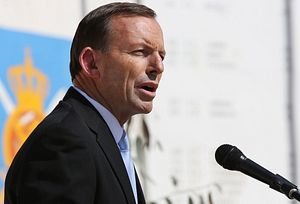When it comes to overseas assistance development, “aid for trade” is the new paradigm adopted by the government of Tony Abbott. What this exactly means will be set out in the coming weeks when the foreign minister releases her much awaited aid statement, but it’s likely to focus on the private sector and its capacity to lift the world’s impoverished out of poverty.
While the private sector certainly has an important role to play in delivering higher growth and opportunities, the foreign minister has failed to appreciate the long-term national benefits that Australia derives from its overseas development aid.
Take the case of South Korea. In the aftermath of the Korean War, South Korea was one of the poorest nations in the world. In conjunction with the United States, Australia helped to rebuild the country’s economy, which is now the world’s 14th largest. South Korea is Australia’s third largest export market, with two-way trade worth A$30 billion ($28 billion) per year – and Canberra has recently finalized a free trade deal that is expected to create 1,000 new jobs in Australia within the first year alone. In addition to South Korea, as Bill Gates observed last year, China, Malaysia and Thailand have been transformed from aid recipient countries into some of Australia’s largest trading partners.
But foreign aid pays more than just economic dividends. South Korean forces, for instance, have served alongside Australian forces in vital UN peacekeeping operations, including Vietnam, East Timor and Afghanistan. Given these multidimensional benefits, it’s surprising to see Australia cut its foreign aid at the very time that it is spending $16 billion on the purchase of 58 US F-35 Joint Strike Fighter (JSFs) aircraft.
This is not the place to pit foreign aid against defense spending, but it is worth mentioning that our understanding of “national security” has changed dramatically over time, and that the purchase of these aircraft accords only with a narrow and increasingly irrelevant concept of the term.
During the Cold War, when the term “national security” was invoked, it would doubtless have involved the purchase of planes, tanks and ships. The build up of arms that followed was justified by strategists using theories such as Mutually Assured Destruction (MAD) and the Prisoners’ Dilemma – that the more arms we acquired, the less we’d have to use them and the safer we’d be. But in the post-9/11 world, these strategies have become irrelevant, as threats to national security have become opaque; nowadays, it’s not as easy to distinguish between a combatant and a non-combatant.
This blurred line has forced a change in many of our operations – towards “hearts and minds” missions, by which we provide to those most in need the kinds of basic infrastructures that we enjoy. These operations align with a new concept of security: one that places the individual, rather than the nation-state, at the center of concern. As a result, “human security” has become the new catch-cry in many strategic circles. Ensuring human security – defined generally as the freedom from fear and freedom from want – is about ensuring people have the basic means of survival. To put the term in context, take the example of asylum seekers. What makes people sail in a rickety boat across treacherous seas for weeks on end? It is their insecurity; they seek asylum from it.
But more so than national security, human security requires a multidimensional effort, in which hearts and minds missions are only one element. And yes, creating an enabling environment for the private sector is another, but this is expected to touch at best two-thirds of the poor. For those untouched by the benefits of economic growth, foreign aid plays a fundamental role. It is this new understanding of security that has breathed new life into the importance of foreign aid, and is the reason why developed countries are being asked to commit 0.7 percent of their national incomes to overseas development.
The government may be right to talk about a new paradigm for foreign aid, but for reasons other than those its foreign minister has cited thus far. While Australia has seen the economic dividends of foreign aid in South Korea, China, Malaysia, and Thailand, ensuring human security implies efforts across a multiplicity of organizations. It’s ironic, then, that the only dividend from the redirection of funds from aid to the purchase of the JSFs may well be insecurity itself.
William Cuming works for the Global Poverty Project as a Global Policy and Advocacy Associate. He formerly served in the Royal Australian Navy where he worked on Defence-led operations, primarily in the Asia-Pacific and is an award-winning writer for the Australian Institute of International Affairs.

































